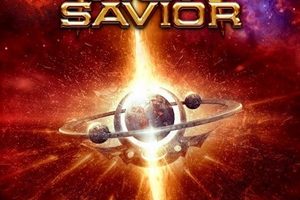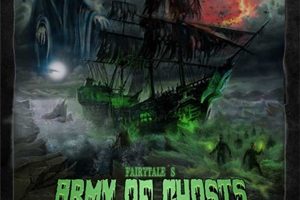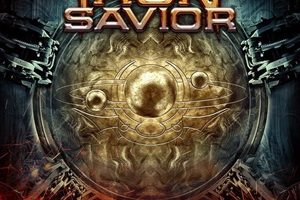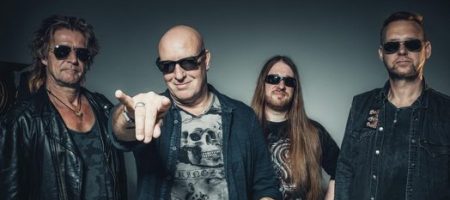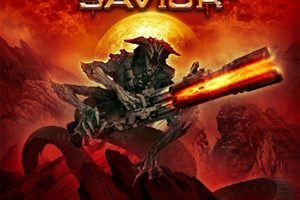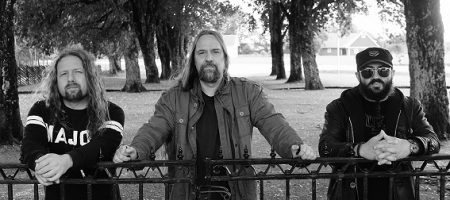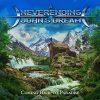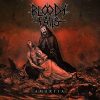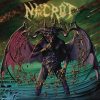Iron Savior – In for the Kill
Wednesday, 10th April 2019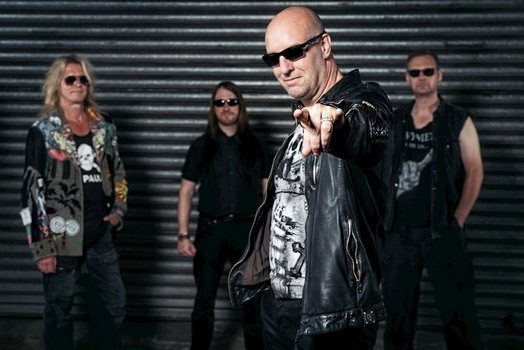
Guitarist/vocalist Piet Sielck keeps the metal guard alive and kicking through his work not only as a metal producer, but also his original act Iron Savior. Hard to believe the band are now up to their tenth original studio album with the impressive Kill or Get Killed. The band stands as a testament to keeping the power metal on point – traditional in stance and never wavering from the mission, where you worry about modern/alternative influences infiltrating the compositions.
Reaching out to speak to Piet, the 55-year old has the same enthusiasm for his work and the genre as he probably had in his teens and twenties. You’ll learn more about the band’s drummer shift, the ideas behind the videos for this record, and numerous thoughts on science fiction, his outlook on production, and the importance of work/life balance.
Dead Rhetoric: Kill or Get Killed is the tenth original Iron Savior studio record. Take us through the development of this record – and did you ever imagine you’d record ten albums with the same band in your career?
Piet Sielck: Well, I started to believe this after a couple of years. This all pretty much you know, Iron Savior started out as a project that I did to please myself. Twenty years later we are here talking about the tenth regular studio album, plus additional other outputs, so if you put the question to me twenty years ago, I would have said no, I couldn’t imagine it. It became quite normal for me to do records, I still enjoy it as you can hear with Kill or Get Killed.
The story behind this one… there is no big story! I just started writing the songs, and stopped writing songs when I did the Reforged album in between. I got back to songwriting last summer for Kill or Get Killed, and looking back now we had a pretty good run as I’m still very happy with the whole thing. Especially the songwriting, I think it really kills! (laughs)
Dead Rhetoric: Did you have the idea right away to base a lot of the songs based on the sci-fi book Pandora’s Star that you used as inspiration for the lyrics?
Sielck: Not particularly. First of all, I start with the music. And then when it comes to the lyrics, I stare a couple of weeks onto blank sheets and as pressure rises because the deadline is drawing nearer, and then come the ideas (laughs). When I wrote the song “Kill or Get Killed” and I was done with that one, now somehow this audio book I heard a couple of years ago popped up in my mind and I liked this character, this morning-like mountain dude, taking over the whole universe and killing everything. There was a pretty big picture stuck in my head, why not adapt this a little bit. Also with Kill or Get Killed I had the will at least to do something different than Titancraft. I made the cover different, the music is still Iron Savior, the music is more basic and back to the roots of the first album, and that’s probably connected to the work of Reforged in between.
Dead Rhetoric: Sometimes we do get influenced by what we most recently work on, so do you think revisiting the old material with Reforged shaped the direction of the new record?
Sielck: Not on a conscious level, but unconsciously I’m quite sure. I really dug into that old material when recording the Reforged albums. The memories that I stored with those songs, I definitely enjoyed that. The beauty or easiness of the first years of the band, I didn’t think too much about the band, I was just writing songs and the composing world was wide open to me because I didn’t write that much stuff at that point. A song like “Prisoner of the Void” or “For the World” from the first album, I really dig redoing those ones. The spirit of those songs carry over to the songwriting of Kill or Get Killed. On the other hand, the songs that I started out on before I stopped to do the Reforged album were “Stand Up and Fight”, “Sinner or Saint” and “From Dust and Rubble”, which were quite easy songs to develop as well. The decision to make the album more straightforward was pretty set already.
Dead Rhetoric: You lost long-time drummer Thomas Nack in 2017 and gained Patrick Klose. How did it feel to make that change, and what do you think Patrick brings to the table that is different or unique compared to Thomas’ playing?
Sielck: Thomas has been a great drummer and a hell of a guy, he would probably still be in this band but there is this tiny little thing that you have to make money somehow to make a living. To feed your family, and so Thomas lives off his drumming completely, and a couple of years ago he got this really good offer to play for a musical here in Hamburg, and that is very time consuming. He would have to play sometimes two shows per day, seven days a week, so there was no time on the side to do anything else. Since Thomas knew that this wouldn’t change for quite a while, and he would really block the band, he decided it was best to part ways. And that’s what we did – but we did part on the best of terms, in the end it was a good decision for him and for the band.
What we gain with Patrick is we gained a true, classic heavy metal/ power metal drummer. He really lives this kind of music – and his drumming for Iron Savior is maybe a little bit better than what Thomas does. Thomas is a versatile drummer – he can play metal, swing stuff, everything. He’s been a hell of a guy, and Patrick may not be as flexible as Thomas, but he nails the stuff for Iron Savior.
Dead Rhetoric: Where do you see the commonalities between sci-fi and heavy metal that seem to meld together so well in the Iron Savior landscape?
Sielck: I don’t know – if you are my age, you may have seen this cartoon movie, Heavy Metal? (laughs). That’s probably not the only reason why heavy metal and science fiction combine so well. I’ve been an avid science fiction guy all my life- I started watching Star Trek the series when I was eight years old, the first original tv show came here to the German television screens. I have been addicted ever since – I’ll watch all the new shows on Netflix or Amazon Prime right away – read books and stuff like that. Science fiction is one big interest and influence, along with heavy metal music. It was natural for me to combine these two things with Iron Savior, and I did that twenty years ago and I still like it.
Dead Rhetoric: The two videos you’ve released for the title track and “Stand Up and Fight” showcase a bit of the band’s personality (especially with the in the car/lip synch action for the latter) – what are your thoughts on the video medium in today’s social media driven scene versus the older video channel/television days?
Sielck: I think of course there is more of a demand for video than let’s say twenty years ago where there were only these video shows on MTV, VH1. Here in Germany, there wasn’t anything like that for a long time- there was a video show that would only be on television once a week and that was totally crazy because they had one hour of music videos. In the 80’s it was a completely normally thing. Nowadays with YouTube, everybody has to have a video – you can do a lyric video or play the audio with some pictures, but that’s different than an actual video.
With Iron Savior, it’s a little bit different. Again, like with others – we are not the type of guys that would do serious videos too much. We tried that with the “Way of the Blade” video, and it didn’t work out too well for us to be honest. We worked in a little joke, but it was lame. This time, we thought we wanted to make things a bit more personal, so we had the “Kill or Get Killed” video shot in our rehearsal room in a more private atmosphere, and I think that works pretty nicely. And the second video… the first idea was to do it in the car, and somehow the car idea didn’t make it for “Kill or Get Killed”, so when we had to postpone the release in Germany for a week because of DHL not delivering the signed autograph cards in time we decided to put out a fourth song, “Stand Up and Fight” to give the people something more while they are waiting for the album, and that’s where the car idea came in again. It’s one of our favorite videos, and I really love it.
Dead Rhetoric: I think people can relate to that new video, because you see so many people singing along to their favorite songs in their cars, and filming it on their phones…
Sielck: Or singing in the showers, but that would have been much harder for us to do. We decided that singing in the car was the best way. You have a really great idea for a video, but then do you also have the budget to do that video. For example an Iron Savior, Star Wars-like combat space battle scene also would be nice, but most of the time we don’t have the budget for a production like this. In the end, I think it’s better to do something like this than a lame band performance in metal-like surroundings doing the regular kind of stuff. There are so many videos out there, sometimes I doubt that people really want to watch this.
Dead Rhetoric: What are the challenges that Iron Savior faces creatively when you’ve established a style that gains acceptance early on? Do you find that you are even more self-critical when developing new material to put out your very best efforts?
Sielck: Yes, I have been very self-critical from the very first minute on it. Because there’s no use in creating something that is not 100% approved by me or my feelings. The fans would find out that the album or the song is not cool, you know? I’d rather take my time, and after twenty years I have all the time in the world to come with an Iron Savior album. If it takes a year longer, it takes a year longer, but most of the time I am good with a two-year period. I have enough time to come up with new ideas and be very critical with them – throw away stuff, come up with new stuff, and work on the songs and the compositions until they really fit and satisfy me 100%. Sometimes if the pressure is high, I will agree to 95%, that’s the lowest I’ll get.
Dead Rhetoric: When it comes to producing, you work with newer bands as well as veterans of the scene. Does your philosophy or outlook change depending on the seasoning and experience of the musicians on hand – where do you see your role in the overall outcome?
Sielck: Working with others over the years, I change with my approach. In the early years, especially with the younger bands, I thought they didn’t know shit and I had to take them by the hand and show them how this goes. How studios and recordings and even their music is working. With some bands it was a good thing, with some other bands it was not such a good thing. I think by the time now, I’m a pretty good team worker and make suggestions, and I make corrections here and there. I speak up if something really sucks, but I still leave my clients enough room for their own character. There’s no good if everything I do in my studio sounds just as Iron Savior, just with a different voice (laughs).
I have learned how to shape the stuff of others without killing their spirit. I enjoy this, I think the basic thing is you have to stay open-minded to new stuff, new techniques and still do development. Do not stagnate- that’s what I’m trying to do in my studio when I’m working for Iron Savior or others.
Dead Rhetoric: In an older interview you did for Snakepit magazine around the Unification album cycle, you mentioned the lack of distinction and glut of albums in the metal market. Would you say things have gotten worse or better in today’s scene – and what can be done to maybe right that ship for the consumers and musicians alike?
Sielck: Well, to be honest I don’t think too much has changed. What has changed is the consumers- they have changed. Let’s say ten years ago, they were confused. There is new music, variety, but over the past ten years it’s very confusing to have over hundreds and hundreds of new releases every month. Nobody can ever dig through that. What people end up doing is they come back to buy stuff which is there already, stuff that is known. They won’t do too much experimenting. That’s a good thing for us, because Iron Savior is a pretty old band, the name is known so we don’t have this kind of problem. People buy Iron Savior (records) because they know (with) what they’ll buy they’ll get a good record.
Ten-fifteen years ago, in the underground things were more experimental and people were willing to check out new things. I think by now the majority of the fans have found out that it’s nice to have this variety, but also lies the danger that you can get lost and drown in these endless releases month by month.
Dead Rhetoric: Do you believe this has placed more of an emphasis on the live show, to have bands now stand out over the release mania?
Sielck: Live is something that is a unique thing. I don’t know if people now really dig into live performances more over recorded music. On the other hand, the demand for bands to earn money by playing live is increasing. A CD you can easily copy nowadays- there’s no big deal to make an unauthorized copy to give or sell to your friends. CD sales are decreasing year by year, so bands and musicians are working against that and performing live because that is something you can’t copy. It’s made by the musician at that very moment and you can either hear it or not – pay for it, or you don’t see the band.
Dead Rhetoric: Are you satisfied with the staff and promotion team at AFM Records – especially given your experience running a label in the past?
Sielck: Yes, actually I am still with AFM Records because I think they do a really good job. The album is promoted all over the world. The European promotion works really nicely, the album is visible everywhere and all the media partners are supplied. They take notice of Iron Savior. I don’t know how big the media scene for power metal is stateside, but AFM does a good job.
Dead Rhetoric: How have your views on life, career, and music evolved from your youth to current times?
Sielck: When I was in school, I was 100% sure that I would become a rock star. That changed a little bit when I was around 20-21 that I probably won’t be a rock star. It came back when I decided to try Iron Savior, and found out that maybe I wouldn’t become a big rock star, but maybe a small rock star (laughs). That’s how my perspective changed. I still like what I do, I wouldn’t consider myself a rock star, I’m a musician who has the ability to make and create music, put out albums on a regular basis, and I have a great reliable group of fans and followers around this. Iron Savior has been there for twenty years now, and will be around for quite a while in the future. Life is good for me.
Dead Rhetoric: What’s left on the bucket list for you to accomplish – either personally or with Iron Savior?
Sielck: I think with Iron Savior I would like to do a couple of more albums. There is nothing I really need to achieve with Iron Savior anymore. I (have achieved) quite a lot. The best thing I have achieved is I can do Iron Savior, be here in my studio and create music, but also have a life besides that. I have managed over the years to balance things out. I’m not just an Iron Savior maniac who has no family, but on the other hand I also have a life beside Iron Savior and I enjoy that very much. Both are working.
Dead Rhetoric: How do you see the next twelve months shaping up for Iron Savior-related activities?
Sielck: The next twelve months – we will do some live shows. I have a couple of production jobs here in my studio that I have to work on. At the end of the summer I will start getting back into more songwriting. For the second half of the year, Iron Savior are planning to do some club shows with our friends in Paragon- who also will release their new album Controlled Demolition this April. We will do some Italian shows with our friends in Airborn, we will do some shows in Germany. Not too much, not too little- great appearances of Iron Savior. The Hamburg Metal Attack tour! (laughs).











